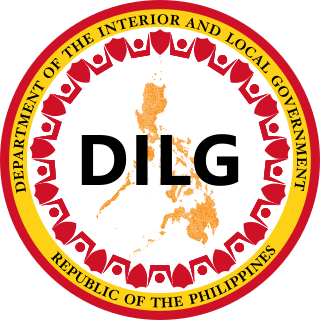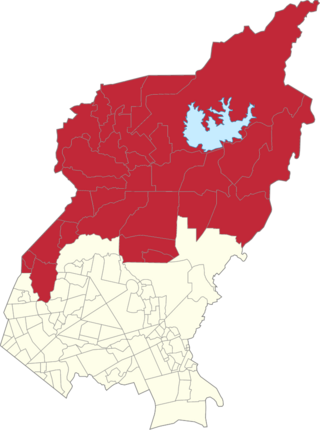 |
|---|
Barangay elections were held in the country's 42,000 barangays for the positions of barangay captains and six councilors on May 12, 1997.
 |
|---|
Barangay elections were held in the country's 42,000 barangays for the positions of barangay captains and six councilors on May 12, 1997.

A barangay, historically referred to as a barrio, is the smallest administrative division in the Philippines and is the native Filipino term for a village, district, or ward. In metropolitan areas, the term often refers to an inner city neighborhood, a suburb, a suburban neighborhood, or even a borough. The word barangay originated from balangay, a type of boat used by a group of Austronesian peoples when they migrated to the Philippines.
Elections in the Philippines are of several types. The president, vice-president, and the senators are elected for a six-year term, while the members of the House of Representatives, governors, vice-governors, members of the Sangguniang Panlalawigan, mayors, vice-mayors, members of the Sangguniang Panlungsod/members of the Sangguniang Bayan, barangay officials, and the members of the Sangguniang Kabataan are elected to serve for a three-year term.

The government of the Philippines has three interdependent branches: the legislative, executive, and judicial branches. The Philippines is governed as a unitary state under a presidential representative and democratic constitutional republic in which the president functions as both the head of state and the head of government of the country within a pluriform multi-party system.

The Department of the Interior and Local Government, abbreviated as DILG, is the executive department of the Philippine government responsible for promoting peace and order, ensuring public safety and strengthening local government capability aimed towards the effective delivery of basic services to the citizenry.
Synchronized Barangay and Sangguniang Kabataan (SK) elections were held on October 29, 2007, based on the newly amended Republic Act No. 9340, approved on September 22, 2005, by the 13th Congress of the Philippines which prescribed that Barangay and SK elections would occur on the last Monday of October 2007 and in subsequent elections after three years. The 14th Congress of the Philippines tried twice to reset the Barangay and SK Elections instead to May 2008 so the elections could be trial for the computerization of elections following Republic Act No. 9369, also known as Amending the Election Modernization Act but were unsuccessful since the Senate rejected the bill. The elections were held in the country's 41,995 barangays and contested 41,995 posts for the Barangay Chairman also known as the Punong Barangay also for the SK Chairman and 293,965 posts for the Members of the Sangguniang Barangay also known as the Barangay Kagawad also for the Members of the Katipunan ng mga Kabataan also known as the SK Kagawad.
A national plebscite and local plebiscites were held on April 7, 1981 in the Philippines. The plebiscite was set to amend the following revisions made by the Interim Batasang Pambansa, pursuant to Batasang Pambansa Blg. 122:
Barangay elections were held for the first time in the country's 42,000 barangays for the positions of barangay captains and six councilors on May 17, 1982 following the Batas Pambansa Blg. 222 or the Barangay Election Act of 1982.
Barangay elections were held in the country's roughly 42,000 barangays for the positions of barangay captain and six councilors on March 28, 1989. Such elections are supposed to be held every three years but have often been postponed. Originally scheduled for November 1988, President Corazon Aquino and the military recommended its postponement for concern that infrastructure projects could be delayed in the provinces.
Barangay elections were held in the country's 42,000 barangays for the positions of barangay captains and six councilors on May 9, 1994.
Kabataang Barangay elections (KB) were held on May 26, 1980, in which about 3 million Filipino youths aged 15 to 18 years old participated. Each Barangay in the Philippines is mandated by law to have its own chapter of the Katipunan ng Kabataan in which the members elect their officers called as the Kabataang Barangay.
The Sangguniang Barangay, also known as the Barangay Council, and formerly as the Rural Council and then the Barrio Council, is the legislative body of a barangay, the lowest form of government in the Philippines. The term is coined from the Tagalog words sanggunian and barangay.
A barangay councilor is an elected government official who is a member of the Sangguniang Barangay of a particular barangay. The barangay is the smallest political unit in the Philippines, and the council serves as the legislature of the barangay and is headed by the barangay captain or punong barangay.

Sangguniang Kabataan is a council meant to represent the youth in each barangay in the Philippines. It was put "on hold", but not quite abolished, prior to the 2013 barangay elections. In January 2016, the Sangguniang Kabataan Reform Act was signed into l,aw which made some significant changes to the SK and initially scheduled new elections for October 2016. In March 2017, the elections were postponed anew to May 2018.
Synchronized Barangay and Sangguniang Kabataan (SK) elections were held on October 25, 2010, in the Philippines. The electorate elected in nonpartisan elections, the Barangay chairman also known as the Punong Barangay and members of the Sangguniang Barangay for voters aged 18 and above. While voters aged 15 to 17 voted for the chairman of the Sangguniang Kabataan and members of the Katipunan ng mga Kabataan. Due to funding issues, the Commission on Elections opted to use the manual voting system instead of the automated elections as was done in the last 2010 national elections.
Barangay elections were held on Monday, October 28, 2013. The election shall elect the Punong Barangay, more commonly known as barangay captains, and members of the Sangguniang Barangay, or barangay council, in 42,028 barangays throughout the Philippines whose terms start on November 30, 2013. Barangays are the smallest local government unit in the Philippines.

A general election in the Philippines took place on May 9, 2016, for executive and legislative branches for all levels of government – national, provincial, and local, except for the barangay officials.
Barangay elections in the Philippines were held on May 14, 2018. The election shall elect the Punong Barangay, more commonly known as barangay captains, and members of the Sangguniang Barangay, or barangay council, in 41,948 barangays (villages) throughout the country whose terms start on June 30, 2018. Barangays are the smallest local government unit in the Philippines.
Barangay and Sangguniang Kabataan elections (BSKE) in the Philippines are scheduled to be held on October 30, 2023. The barangay, commonly translated as "village", is the smallest government authority in the country. The election shall elect the barangay captain or the chief executive of the barangay, and seven of eight members of the Sangguniang Barangay, or barangay council, in 42,027 barangays throughout the country.

Quezon City's 2nd congressional district is one of the six congressional districts of the Philippines in Quezon City. It has been represented in the House of Representatives of the Philippines since 1987. The district consists of the eastern barangays bordering Marikina, San Mateo and Rodriguez. From 1987 to 2013, it is the most populous district in the country, encompassing the northern part of Quezon City commonly called as Novaliches, until it was redistricted in time for the 2013 election. Just like its pre-2013 composition, it still includes the Batasang Pambansa, the seat of the House of Representatives. It is currently represented in the 19th Congress by Ralph Wendel Tulfo, of the Nacionalista Party (NP).
Referendums in the Philippines are occasionally held at a national, regional or local level. Referendums can either by national or local in scope. In the Philippines, "referendums" and "plebiscites" mean different things.